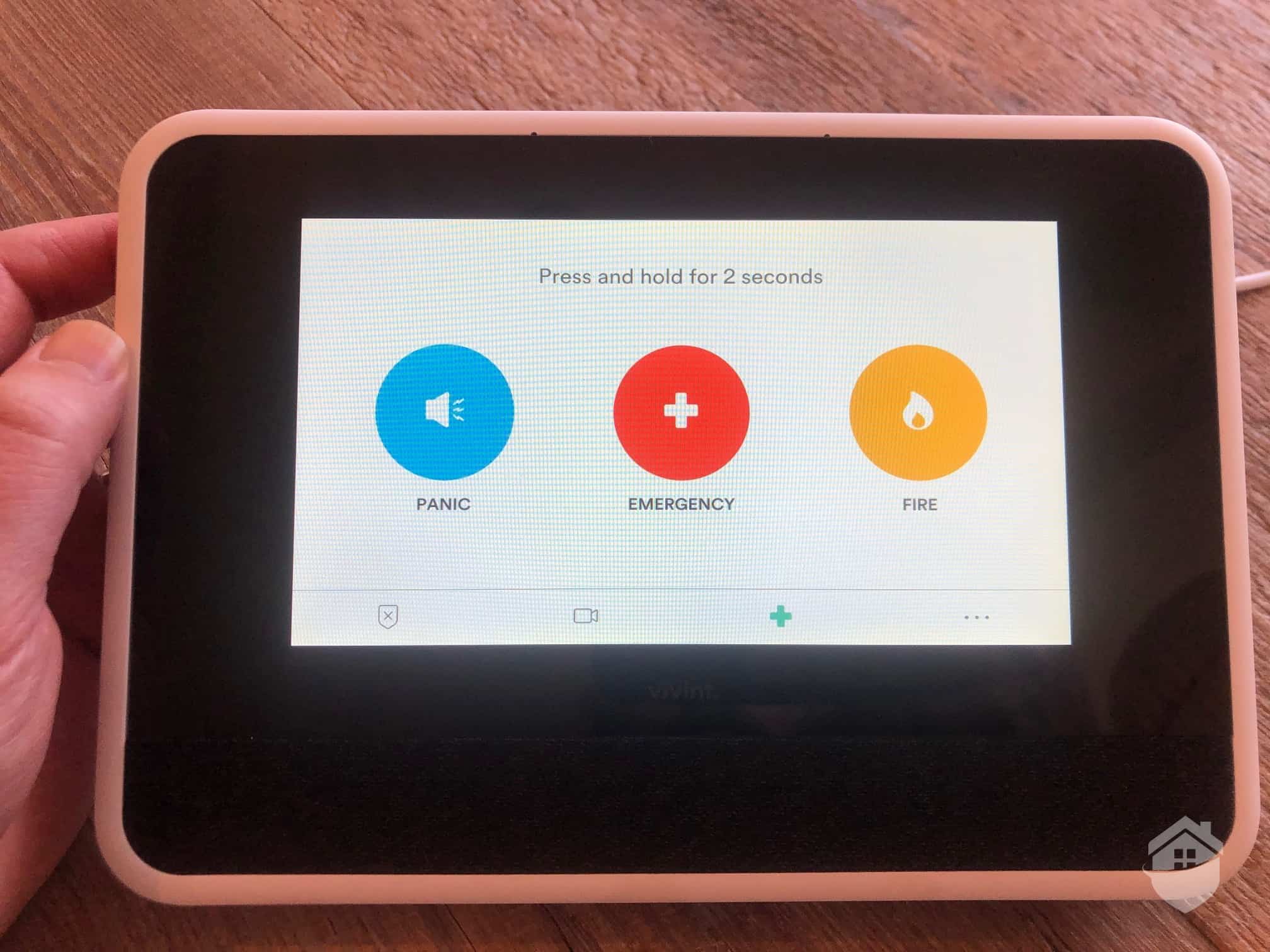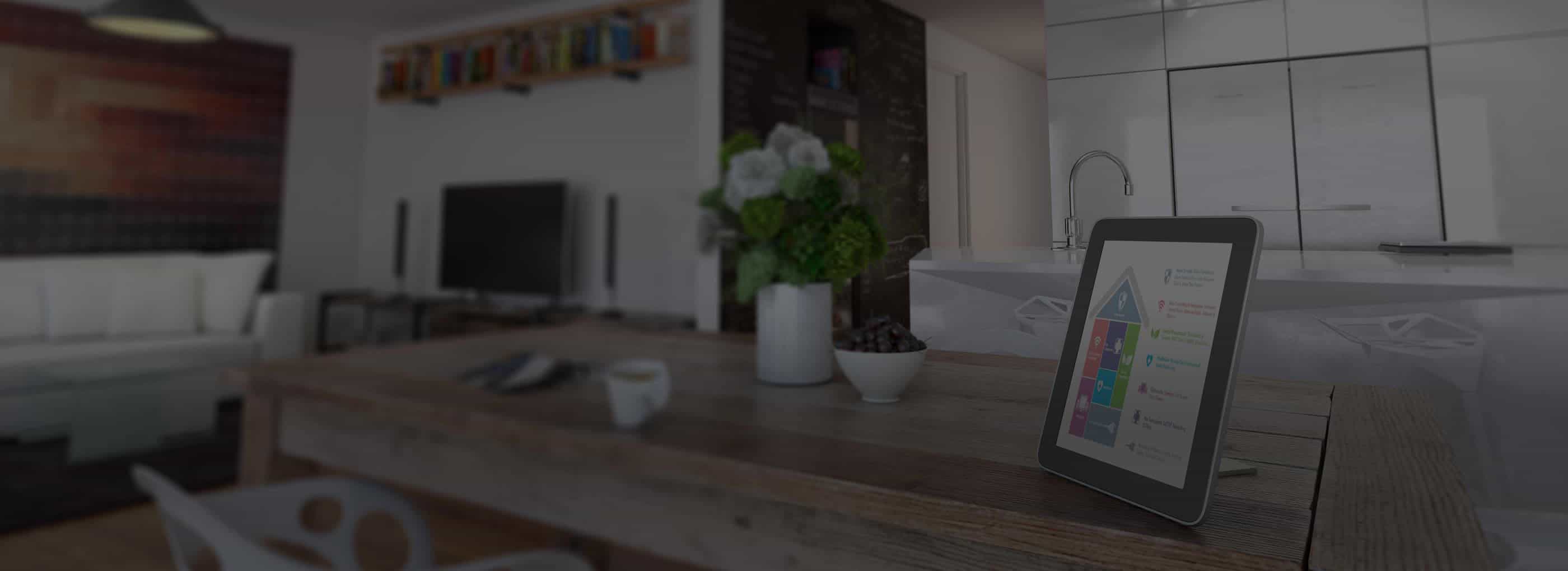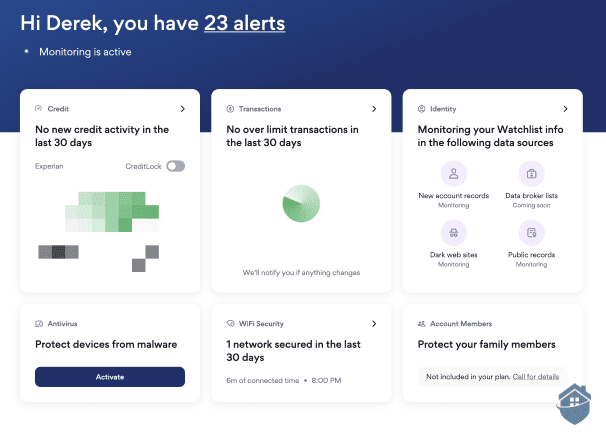When a loved one gets diagnosed with Alzheimer’s or dementia, maintaining their independence while ensuring their safety becomes a delicate balancing act. Thankfully, technology can be helpful in navigating the challenges. There are many solutions that can help patients stay safely in their own homes longer, while also giving their families peace of mind.
After testing over three dozen products specifically designed for dementia care, we learned there are simple, easy to integrate, and customizable solutions. These devices focus on enhancing daily life rather than replacing human connection and care. Here are our findings.

Vivint’s Smart Hub lets you preprogram emergency numbers for the police, fire department, and ambulance.
Understanding the Technology Landscape for Dementia Care
According to the Alzheimer’s Association, over seven million Americans are living with Alzheimer’s or dementia.1 Because of this, the smart home technology market for dementia care has expanded significantly in recent years.
Modern dementia care technology falls into several key categories:
- Safety and monitoring systems to help prevent wandering and detect emergencies.
- Communication tools to maintain connections with family and caregivers.
- Daily living aids to support routine tasks like medication management and meal preparation.
- Cognitive support tools to provide memory aids and brain stimulation activities.
The most successful solutions combine various technologies that work together seamlessly. Rather than isolated gadgets, effective smart home setups create an integrated support system that adapts to the patient’s changing needs over time.
Expert Tip: We recommend starting with one or two simple devices before building a comprehensive system. In our experience, we find it helps older adults get comfortable with the technology gradually.
Essential Smart Home Technologies for Safety and Monitoring
There are some smart home technologies that are non-negotiables. These are the devices we recommend starting with.

Medical alert smartwatches come with many useful features for people living with dementia.
GPS Tracking
Modern GPS devices designed for dementia patients offer real-time location monitoring without being overly intrusive. They can even come in the form of smartwatches, although mobile medical alert systems are still more common.
The best medical alert devices with GPS also include two-way communication, automatic alerts for caregivers, and tamper-resistant designs. Just keep in mind that subscription costs to use these devices typically range from $40 to $60 per month, but the 24/7 monitoring capabilities justify the expense for many families.
Wandering Prevention
Smart door locks with keypad entry can also help dementia patients, especially those who have a tendency to wander. While testing the Yale Smart Lock Pro, we learned it’s compatible with ADT security systems. This means we receive notifications any time the doors open or close, which helps keep tabs on the kids and older adults living under our roof. Plus, installation only takes around 30 minutes, and the device works with existing deadbolts.
>> Related: The Best Smart Locks of 2025
Fall Detection and Emergency Response
Every year, nearly one million older adults are hospitalized because of a fall injury.2 Falls represent a significant risk for dementia patients, particularly those living alone. Modern fall detection systems combine wearable sensors with smart home monitoring to provide comprehensive emergency response.
Medical alert systems designed for dementia patients often include additional features beyond basic fall detection. The Medical Guardian system we reviewed combines a base station with wearable pendants. We found the older adults in our lives appreciated that it includes medication reminders, daily check-in calls, and family notifications. Monthly costs for these systems range from $30 to $70, depending on features selected.
>> Read More: Best Medical Alert Systems with Fall Detection
Communication and Connection Technologies
Maintaining social connections becomes increasingly important as dementia progresses, but that’s also when traditional communication methods can become challenging. These devices can offer support.
Video Calling and Family Communication
Simplified video calling systems are one way for dementia patients to remain connected with their family and friends. Amazon Echo Show devices, for example, offer hands-free, voice-activated video calling. This means they won’t need to navigate confusing smartphone menus just to video chat. The “Drop In” feature allows family members to check in remotely, though privacy settings ensure the patient maintains control over when calls are accepted.
Meta Portal devices prioritize ease of use with automatic camera tracking and noise reduction features. The integration with WhatsApp and Facebook Messenger provides multiple communication options. As a bonus, the device can display family photos as a digital picture frame when not in use.

We use our Alexa Show to check our security camera feeds and chat with loved ones.
Smart Home Assistants and Voice Control
Voice-controlled assistants can provide valuable support for dementia patients and handle routine questions and simple tasks without requiring navigating complex smartphone interfaces. For example, saying “Alexa, good morning” to Amazon Alexa devices might turn on lights, provide weather information, and remind the user about morning medications.
Google Assistant devices offer similar functionality with particularly strong performance in answering general knowledge questions and providing reminders. The Google Nest Hub Max also includes a camera for video calls and can display family photos and appointment reminders on the screen.
Expert Tip: Program voice assistants with simple, consistent commands and practice them with your loved one during setup to ensure familiarity.
Daily Living Support Systems
Routines and reminders are good ways to help older adults deal with dementia. Thankfully, there are technologies that can support them with medication and meal preparation.
Medication Management Technology
Sticking to a medication schedule is challenging for dementia patients. Missed doses can potentially lead to serious health complications. That’s why smart medication management systems that provide automated reminders and monitoring capabilities are essential.
Electronic pill dispensers, for instance, can automatically provide medications at prescribed times. Some can also send alerts to family members and caretakers if doses are missed. These devices connect to Wi-Fi and include mobile apps for remote monitoring.
Smart Kitchen and Meal Preparation
Kitchen safety also becomes increasingly important as dementia or Alzheimer’s progresses. Smart kitchen appliances can reduce risks while supporting independence in meal preparation.
Induction cooktops offer inherent safety advantages because they only heat when in contact with magnetic cookware. The precise temperature control and automatic shutoff features also reduce the risk of overheating or forgotten burners, which can lead to fire.
We also recommend adding smart smoke and carbon monoxide detectors from security companies like ADT and SimpliSafe. These sensors provide early warnings and can send alerts to family members’ phones when activated.
>> Read More: Beware of These 4 Toxic Gasses in Your Home
Cognitive Support and Entertainment Technologies
Lastly, cognitive support devices can improve quality of life and slow down the progression of dementia.3 There are various devices that can aid in this activity.
Memory Aids and Routine Support
Digital memory aids can help dementia patients maintain routines and remember important information longer. These tools work best when they complement rather than replace existing memory strategies.
Digital photo frames with smart capabilities can display rotating family photos with captions identifying people and events. You can also get voice recording devices that enable patients to leave themselves reminders or capture important thoughts.
Smart calendars and reminder systems can be customized to provide gentle prompts for daily activities. They can display the day of the week, time of day, and current date in large, clear text that’s easier for dementia patients to process than traditional clocks.

We set multiple reminders on our MGMove Smartwatch
Brain Training and Entertainment
Engaging cognitive activities can help maintain mental function and provide enjoyable entertainment. Technology-based brain training programs offer structured activities that adapt to the user’s abilities.
Tablets loaded with familiar music, audiobooks, and simple games can also provide hours of entertainment. The key is choosing content that matches the patient’s interests and current cognitive abilities.
Expert Tip: Choose entertainment technologies based on your loved one’s lifelong interests rather than their current abilities – familiar content often remains engaging even as cognitive function changes.
Implementation Strategies and Best Practices
Once you have your devices, the next step is to integrate them into daily activities. Here are our recommendations on how to do this successfully.
Gradual Technology Introduction
Successfully implementing smart home technology for dementia patients requires a thoughtful, gradual approach. Introducing too many new devices simultaneously can create confusion and resistance. We recommend starting with one simple device that addresses an immediate need or concern.
Allow two to three weeks for the patient to become comfortable with each new addition before introducing more devices. This timeline gives both patients and caregivers time to learn the system and identify any usability issues. Try to involve the patient in the selection and setup process whenever possible. When patients feel they have input into decisions about their care technology, they’re more likely to use the devices consistently.

Medical pendants can be a simple non-intrusive introduction to technology for older adults.
Family Training and Support Systems
Technology is only effective if family members and caregivers understand how to use and maintain the systems. Plan for initial training sessions and ongoing support as needs evolve.
Create simple written instructions with large text and clear illustrations for common tasks. Laminate these guides and place them near relevant devices. Include contact information for technical support and family members who can provide assistance. Establish regular check-ins to assess how well the technology is working and identify any emerging issues. And monthly family meetings can help ensure everyone understands the current system and any planned changes.
Privacy and Dignity Considerations
Balancing safety monitoring with privacy and dignity requires ongoing attention and adjustment. Involve patients in discussions about what level of monitoring they’re comfortable with, and respect their preferences whenever possible.
Clearly explain what information each device collects and who can access it. Transparency about monitoring capabilities helps maintain trust between patients and family members. Consider the social implications of visible monitoring devices.
The smart watches and medical alert systems with built-in GPS we’ve tested can be worn discreetly. We find it helps the older adults in our lives maintain their sense of independence and dignity, especially in social situations.
>> Check Out: The Best Medical Alert Watches in 2025
Cost Considerations and Budget Planning
Smart home technology for dementia care involves both upfront equipment costs and ongoing service fees. Understanding the total cost of ownership helps families make smart choices about which technologies to prioritize. Basic safety monitoring systems typically require initial investments of $200-500 per device, plus monthly monitoring fees of $30-80. More comprehensive systems with professional monitoring and emergency response services cost $100-200 monthly but provide 24/7 support.
Communication technologies like tablets and smart displays range from $100-400 for the devices themselves. Of course, ongoing costs depend on internet service and any subscription services you add, typically adding $20-$50 monthly. And daily living support systems vary widely in cost. Simple medication reminders might cost $50-100, while comprehensive automated dispensing systems require monthly fees of $80-150 including medication delivery.
Expert Tip: Contact your insurance provider before purchasing expensive monitoring systems to understand coverage options and pre-approval requirements.
Getting Started
Technology should enhance (NOTE: not replace) human connection and care. The best smart home setups for dementia patients create tools that help families stay connected and provide peace of mind, while allowing dementia patients to maintain dignity and independence in their own homes for as long as possible.
We recommend starting with your loved one’s most pressing needs and build gradually. With careful planning and implementation, smart home technology can improve quality of life for both dementia patients and their families.
Frequently Asked Questions
- How do I know if my loved one with dementia is ready for smart home technology?
Look for specific safety concerns or daily living challenges that technology could address, such as medication management or wandering risks. Start with simple solutions that enhance existing routines rather than creating new ones.
- What happens if the power goes out or internet connection fails?
Choose devices with battery backup for critical safety functions, and consider cellular-based monitoring systems that don’t rely on home internet. Most medical alert systems include backup cellular connections for emergencies.
- Will smart home technology confuse someone with dementia?
Well-designed dementia care technology prioritizes simplicity and familiar interactions. Voice-controlled devices and automated systems often work better than devices requiring complex navigation or menu systems.
- How can I protect my loved one's privacy while using monitoring technology?
Choose devices that allow customizable privacy settings, clearly explain what information is collected, and involve your loved one in decisions about monitoring levels. Many systems allow monitoring of safety-critical information without recording personal conversations.
- Should I install everything at once or gradually introduce new technology?
Gradual introduction works better for most dementia patients. Start with one device that addresses the most pressing concern, allow up to three weeks for adjustment, then add additional technologies as needed.
- What's the most important smart home technology for dementia patients?
Safety monitoring systems typically provide the highest priority benefits, particularly GPS tracking for patients who wander and emergency response systems for those living alone. The specific priorities depend on individual risk factors and living situations.



